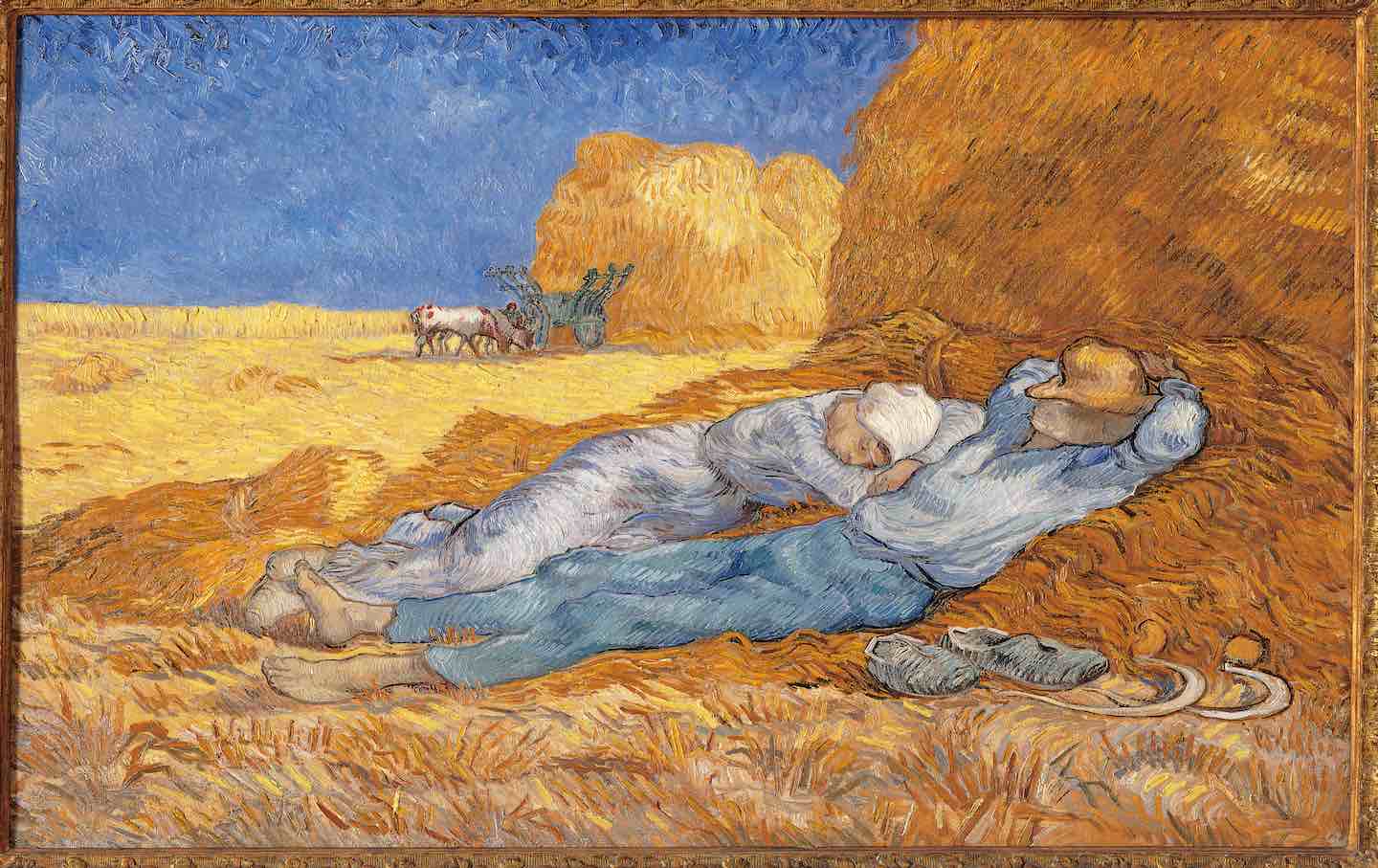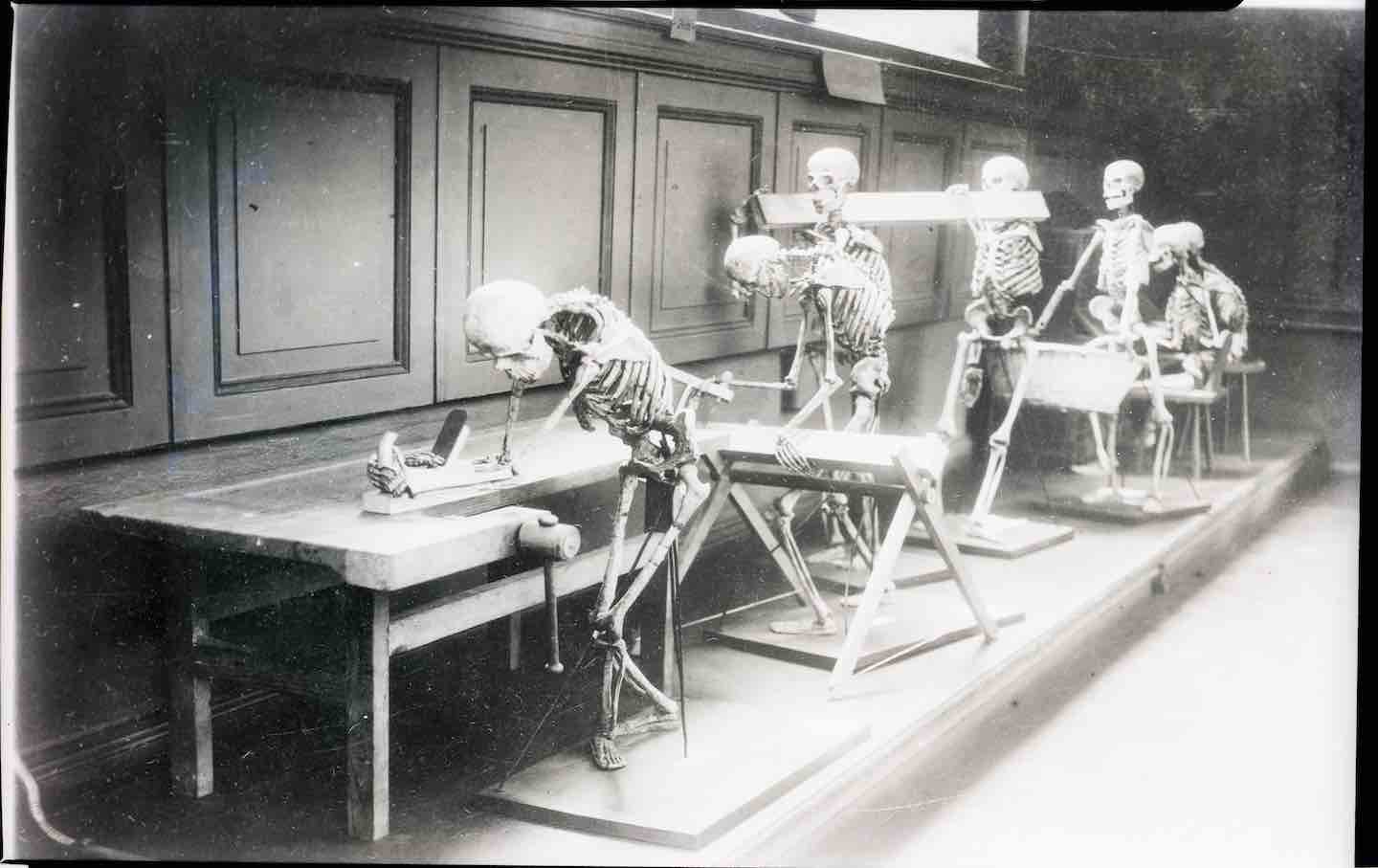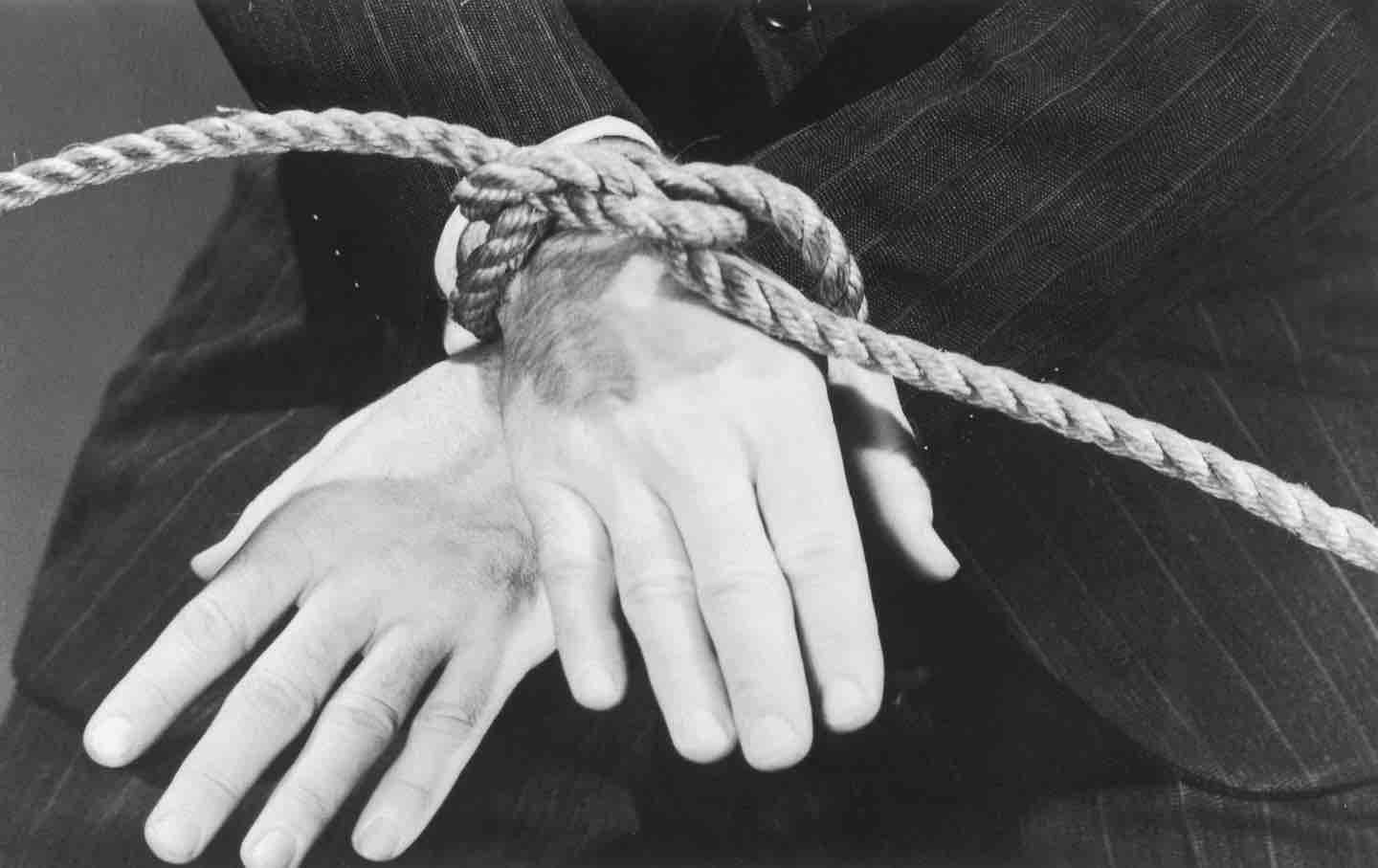You Have “The Right to Be Lazy”
Paul Lafargue’s anti-work manifesto is newly relevant in a time when the very idea of labor is changing.

The Siesta, by Vincent Van Gogh, 1889.
(Courtesy of Mondadori Portfolio / Getty Images)At the heart of the workday resides a fundamental tension, a fact that often seems so readily apparent as to be little else than a facile truism: Our time is not really our own. Most of us devote most of our waking hours to our jobs and generating the wages necessary to reproduce our lives (which includes the weekend interregnum, if we’re lucky) and start the cycle over again. This basic exchange structures daily life and appears so natural as to hardly garner a batted eye over the necessity of such an arrangement. Those oriented toward the left of the political spectrum will proclaim that those exchanged hours should be better remunerated, better protected, and imbued with greater dignity, while those on the right and center might argue that some combination of a free market and meritocracy bestows upon workers the chance to be the owners of tomorrow. Yet the first principle of work’s necessity remains axiomatic to this entire political spectrum.
Books in review
The Right to Be Lazy: And Other Writings
Buy this bookBut what if we were to map out a politics that does away with that sense of necessity altogether? As the literary theorist Frederic Jameson writes, there exists an “alternate tradition of Marxism which wishes not to glorify labor and productivity, but to abolish it altogether,” and a genealogy of this “alternate tradition” takes us not to Marx but further down the family tree to his son-in-law, Paul Lafargue. While Marx’s critique of political economy elucidated the role of labor in the production of surplus value as the key to capital’s mandate, the all-but-forgotten Lafargue contributed a critique of the experience of work itself that continues to pose vital questions about the primacy played within our daily lives by all those hours we must spend on the clock.
Born in 1842 in Santiago de Cuba, of Christian French and Jewish, Black, and Indigenous Creole ancestry, Lafargue became politically active while studying medicine in Paris. His youthful stint as a Proudhonian anarchist would conclude after he joined the First International and ended up in London, his political activities preventing him from finishing his university studies in France. Lafargue became a frequent visitor of the Marx home during his years in London and in 1868 would marry Marx’s second daughter, Laura, in a ceremony in which Engels acted as witness. He would travel back to France upon the declaration of the Paris Commune in 1871 and escaped to Spain upon its fall. While there, he strove to challenge anarchist influence in the Spanish section of the International Workingmen’s Association on behalf of the Marxist faction before eventually returning to England in 1872.
After the deaths of his and Laura’s three children in infancy, Lafargue gave up medicine and ran a small photolithography shop in London, an unsuccessful venture that required him, like his father-in-law, to rely on the largesse of Engels to pay the ever-mounting bills. In 1880, Lafargue cofounded the French Workers Party with Jules Guesde, and it was a disagreement over the party program (Marx found Lafargue and Guesde’s rejection of reformist struggles little more than “revolutionary phrase-mongering”) that led Marx to famously chastise the two. After Lafargue returned to France with Laura in 1882, the French state frequently arrested and jailed him on a variety of charges related to his incitement of the social seizure of private industry. (He would even win a seat in the Chamber of Deputies in 1891 in a campaign run from his prison cell.) In 1911, after lives spent dedicated to the workers’ movement, Paul and Laura killed themselves by taking cyanide together, writing that they wished to die without being burdened by the indignities of losing their mental and physical abilities as they further aged. A representative of the Russian Social Democratic Labor Party, Vladmir Lenin, spoke at their funeral.
During a stint in prison in 1883, Lafargue began reworking a piece he had first composed for L’Égalité three years prior. This essay, The Right to Be Lazy, marks Lafargue’s most lasting contribution to left-wing political theory. “All individual and social miseries,” Lafargue contends, “arise from [the proletariat’s] passion for work.” The key reversal of Lafargue’s essay rests upon the working class’s demand for “the right to work,” a guarantee of access to the wages necessary for social reproduction.
In Lafargue’s formulation, collective demands such as these have the wrong object, only ever guaranteeing the right to have one’s labor exploited and one’s time stolen by another: If you insist on the right to work, he argues, you will inevitably still be yoked to the need to earn a wage. He suggests a radical reorientation of perspective, one that does not take the social arrangements of work as a given and instead sees its goal as the right not to work, the right to free time and leisure, the right to be lazy. Or, as he writes, the proletariat “must proclaim the Rights of Laziness, a hundred thousand times nobler and holier than the Rights of Man cooked up by the philosophizing lawyers of the bourgeois revolution.”
Lafargue’s essay relishes in inversions, none more prominent than his insistence on critiquing the demands of the workers’ movement for discursively remaining in an arena dictated by bourgeois economics. He opens by proclaiming that it is the working class itself that most fervently clings to the “moribund passion for work.” He excoriates the labor movement for only asking for modest changes to the social organization of work rather than demanding that it be completely overturned and reimagined anew. Lafargue notes that workers could read the Scripture for guidance here, since “after six days of work, [Jehovah] rested for eternity,” a holy model of laziness. (In a footnote, he reminds the reader that agricultural production marked “the first manifestation of servile work in human life,” and that we should not see it as a coincidence that “the first criminal, Cain, is a farmer.”)
When the text turns to how work could be abolished, Lafargue, like many of his late-19th-century cohorts, places an excessive amount of faith in the possibilities of automation, believing that “to force capitalists to perfect their machines of wood and iron, we must raise the salaries and reduce the working hours of machines of flesh and bone.” Yet even his vision of a postrevolutionary world of laziness carries with it a warning: The hierarchy of labor should not merely be turned upside down, forcing drudgery upon those owners of capital who work not at all, but rather the very content of what it means to work must be fully uprooted and abolished. Not a soul alive, Lafargue insists, deserves to have the working day imposed upon them.
If the content of work itself exists as a social misery, shouldn’t it “be prohibited, not imposed”? As Lafargue has it, the goal of the laboring classes should be to emancipate themselves from the regime of work altogether, to rearrange the distribution of production toward the goal of working a maximum of three hours per day. Thus, the ultimate goal of socialism, according to Lafargue, would be the reclamation of time, ushering in a “regime of laziness” in which our hours off the clock could fulfill us as we see fit. Here we encounter the primary schism between Lafargue’s political program and that of much of the broader socialist movement: While the latter would strive to enshrine the productive worker as a heroic historical actor who should receive the hard-earned proceeds of their labor, Lafargue sought to demonstrate that the greatest gain of a social revolution would be the ability to collectively determine how to best use our waking hours in the service of anything but working.
Though the romantic overtones of Lafargue’s text invoke the utopian schemes of Fourier more than the rigorous materialism of his father-in-law, the shift in focus from legislatively tinkering around the edges of work to desiring its very content to be reimagined has had real impacts on the way that some in the labor movement of the 19th and early 20th century came to understand work. Lafargue’s “alternate tradition” is not only one of political horizons in which the drudgeries of the working day have been drastically reduced but also one of tactics for accomplishing change in the workplace.
Popular
“swipe left below to view more authors”Swipe →The rise of Taylorist efficiency protocols in the early 20th century would make Lafargue’s argument increasingly relevant to a litany of jobs in which companies sought to sweat out increasingly more work from workers by speeding up the pace. It should then come as no surprise that in the United States, it was the Industrial Workers of the World—those heterodox, turn-of-the-20th-century radicals who sought to establish “one big union” capable of autonomously determining every stage of the production process—who most thoroughly embraced Lafargue’s polemic. The radical Chicago-based Charles H. Kerr publishing house translated and kept Lafargue’s essay in print, where it remained a staple of Wobbly libraries and union halls.
The latest translated edition of The Right to Be Lazy contains essays that broaden the scope of Lafargue as a critical thinker beyond the piece of agitprop he remains most famous for writing. These include a brilliant piece of Marxist literary criticism avant la lettre on the oeuvre of Victor Hugo, as well as a sketch of his memories of his father-in-law that provides insights into Marx’s lesser-known intellectual pursuits, such as his desire to compose a “critical study” of Balzac’s La Comédie humaine after finishing Das Kapital, and the more mundane details of his personal life—for example, his fondness for “extremely flavorful dishes, such as smoked fish and ham, caviar, and cornichons.” The clarion call of The Right to Be Lazy remains, however, the contribution of Lafargue’s that is still capable of inspiring a provocation, asking us to inquire what our days would look like if more of our time was truly ours.
Since the onset of the pandemic over three years ago, the basic foundations of the role that work plays in our daily lives has increasingly been called into question. When faced with the scenario of so much “essential work” being undervalued and so much “nonessential” work being revealed for what it is, the justifications for the exchange of time for wages has begun to come under renewed scrutiny. In France now, we are witnessing a mass movement rooted precisely in the rejection of giving anymore of oneself over to work, an unwillingness to trade two more years of life to an employer. As Charles Reeve writes, one of the slogans making the rounds again in the streets, a recycled slogan from May ’68, reads: “Don’t lose your life earning a living.” Perhaps we may yet have something to learn from Lafargue’s insistence upon the virtues of demanding our collective free time, and we may once again see the return of another slogan made popular in France during the 1968 uprisings: “Never Work.”
We cannot back down
We now confront a second Trump presidency.
There’s not a moment to lose. We must harness our fears, our grief, and yes, our anger, to resist the dangerous policies Donald Trump will unleash on our country. We rededicate ourselves to our role as journalists and writers of principle and conscience.
Today, we also steel ourselves for the fight ahead. It will demand a fearless spirit, an informed mind, wise analysis, and humane resistance. We face the enactment of Project 2025, a far-right supreme court, political authoritarianism, increasing inequality and record homelessness, a looming climate crisis, and conflicts abroad. The Nation will expose and propose, nurture investigative reporting, and stand together as a community to keep hope and possibility alive. The Nation’s work will continue—as it has in good and not-so-good times—to develop alternative ideas and visions, to deepen our mission of truth-telling and deep reporting, and to further solidarity in a nation divided.
Armed with a remarkable 160 years of bold, independent journalism, our mandate today remains the same as when abolitionists first founded The Nation—to uphold the principles of democracy and freedom, serve as a beacon through the darkest days of resistance, and to envision and struggle for a brighter future.
The day is dark, the forces arrayed are tenacious, but as the late Nation editorial board member Toni Morrison wrote “No! This is precisely the time when artists go to work. There is no time for despair, no place for self-pity, no need for silence, no room for fear. We speak, we write, we do language. That is how civilizations heal.”
I urge you to stand with The Nation and donate today.
Onwards,
Katrina vanden Heuvel
Editorial Director and Publisher, The Nation
More from The Nation

The Perils of a Post-Racial Utopia The Perils of a Post-Racial Utopia
In Nicola Yoon’s One of Our Kind, a dystopian novel of a Black upper-class suburb’s secrets, she examines the dangers of choosing exceptionalism over equality.

Why Americans Are Obsessed With Poor Posture Why Americans Are Obsessed With Poor Posture
A recent history of the 20th-century movement to fix slouching questions the moral and political dimensions of addressing bad backs over wider public health concerns.

Thomas Müntzer’s Misunderstood Revolution Thomas Müntzer’s Misunderstood Revolution
A recent biography of the German preacher and leader of the Peasants’s War examines what remains radical about the short-lived rebellion he led.

Is It Possible to Suspend Disbelief at Ayad Akhtar’s AI Play? Is It Possible to Suspend Disbelief at Ayad Akhtar’s AI Play?
The Robert Downey Jr.–starring McNeal, which was possibly cowritten with the help of AI, is a showcase for the new technology’s mediocrity.

Possibility, Force, and BDSM: A Conversation With Chris Kraus and Anna Poletti Possibility, Force, and BDSM: A Conversation With Chris Kraus and Anna Poletti
The two writers discuss the challenges of writing about sex, loneliness, and the new ways novels can tackle BDSM.

Lore Segal’s Stubborn Optimism Lore Segal’s Stubborn Optimism
In her life and work, she moved through the world with a disarming blend of youthful curiosity and daring intelligence.


